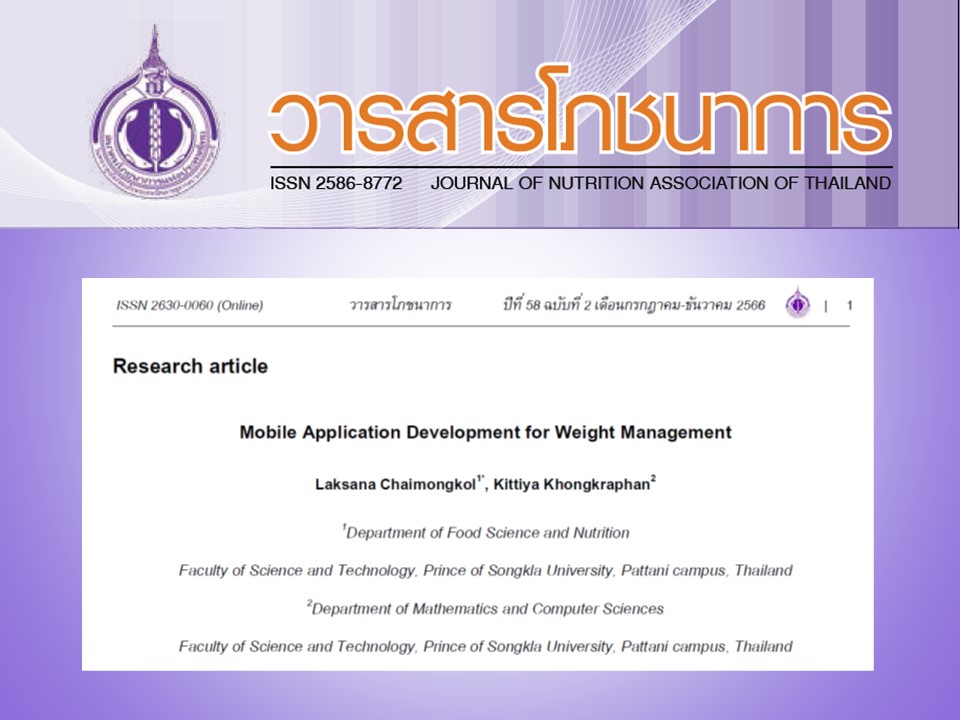Mobile Application Development for Weight Management
Keywords:
weight management, application, smartphoneAbstract
Smartphones have become ubiquitous, and various applications for healthcare and control of non-communicable diseases are in use. This approach can enhance accessibility, reduce costs, as well as remove some barriers to active utilization of conventional healthcare services. This study aimed to develop a mobile application for weight management. Surveys exploring the needs were done, and database design was intended to meet the user requirements. The program includes three core processes of the weight management program, namely (1) behavior change modification therapy, (2) self-monitoring of own data, and (3) personalized recommendations and feedback. The program was tested by 57 adult volunteers. Finally, the application “Sat-PN slim coach” was established. Key functions of the program include creating self-awareness, diet & exercise plan, self-monitoring, and feedback on progression of weight management result. About 82.5% of the testers were satisfied with the application. An efficacy trial of the “Sat-PN slim coach” should be performed before launching it to the public.
References
GBD 2013 Mortality and Causes of Death Collaborators. Global, regional and national age-sex specific all-cause and cause-specific mortality for 240 causes of death, 1990-2013: a systematic analysis for the Global Burden of Disease Study 2013. Lancet. 2015;385(9963):117-171. DOI: 10.1016/S0140-6736(14)61682-2
ทักษพล ธรรมรังสี. ออนไลน์. วิกฤตปัญหาโรคอ้วน:ภัยเศรษฐกิจ พิษสังคม. http://www.rcot.org/datafile/_file/_doctor/114d87b035aa9f10c931378fc72e39f5.pdf สืบค้นเมื่อ 23 มกราคม 2562
แผนงานวิจัยนโยบายอาหารและโภชนาการเพื่อการสร้างเสริมสุขภาพ. 2558. อาหารและโภชนาการในประเทศไทย: เราอยู่ตรงจุดใดในปัจจุบัน. รายงานประจำปี แผนงานวิจัยนโยบายอาหารและโภชนาการ เพื่อการสร้างเสริมสุขภาพ. มูลนิธิเพื่อการพัฒนานโยบายสุขภาพระหว่างประเทศ, นนทบุรี. หน้า 16-19.
Gilmore LA, Duhe AF, Frost EA, Redman LM. The technology Boom: A new era in obesity management. J Diabetes Sci Technol. 2014;8(3): 596-608. DOI: 10.1177/1932296814525189
Lee J, Chol M, Lee SA, Jiang N. Effective behavioral intervention strategies using mobile health applications for chronic disease management: a systematic review. BMC Medical Inform Decis Mak. 2018;18:12. DOI: 10.1186/s12911-018-0591-0.
Laranjo L, Lau AYS, Martin P, Tong HL, Coiera E. Use of a mobile social networking intervention for weight management: a mixed methods study protocol. Br Med J. 2017;7:e016665. DOI: 10.1136/bmjopen-2017-016665
สำนักงานสถิติแห่งชาติ (ออนไลน์). แนวโน้มคนไทยใช้สมาร์ทโฟนมากขึ้น.ข่าวประชาสัมพันธ์สำนักงานสถิติแห่งชาติ. สืบค้นจาก http://www.nso.go.th/sites/2014/Pages/ActivityNSO/A24-05-60.aspx สืบค้นเมื่อ 23 มกราคม 2562.
World Health Organization, International Association for the Study of Obesity, International Obesity Task Force. 2000. The Asia Pacific Perspective: Redefining Obesity and Its Treatment. Health Communications Australia, Sydney. p. 17.
Higgins JP. Smartphone Applications for Patients’ Health and Fitness. Am J Med. 2016;129(1):11-19. DOI: 10.1016/j.amjmed.2015.05.038

Downloads
Published
How to Cite
Issue
Section
License
Upon acceptance of an article, copyright is belonging to the Nutrition Association of Thailand.


